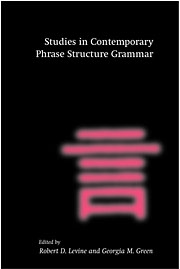Book contents
- Frontmatter
- Contents
- Introduction
- 1 The lexical integrity of Japanese causatives
- 2 A syntax and semantics for purposive adjuncts in HPSG
- 3 On lexicalist treatments of Japanese causatives
- 4 “Modal flip” and partial verb phrase fronting in German
- 5 A lexical comment on a syntactic topic
- 6 Agreement and the syntax–morphology interface in HPSG
- 7 Partial VP and split NP topicalization in German: an HPSG analysis
- Index
6 - Agreement and the syntax–morphology interface in HPSG
Published online by Cambridge University Press: 16 December 2009
- Frontmatter
- Contents
- Introduction
- 1 The lexical integrity of Japanese causatives
- 2 A syntax and semantics for purposive adjuncts in HPSG
- 3 On lexicalist treatments of Japanese causatives
- 4 “Modal flip” and partial verb phrase fronting in German
- 5 A lexical comment on a syntactic topic
- 6 Agreement and the syntax–morphology interface in HPSG
- 7 Partial VP and split NP topicalization in German: an HPSG analysis
- Index
Summary
Introduction
The question of agreement in natural language has received much attention in recent years (cf. for instance the introduction of heads and accompanying projections for agreement with subject (“AgrS”) and object (“AgrO”) in recent transformational work). Its importance in phrase-structure-based approaches to grammar is evidenced by the fact that a whole chapter is devoted to this topic in the latest monograph on HPSG (Pollard and Sag 1994). While there are probably few other places in the literature covering a similarly wide array of facts in such detail, questions remain about both the general approach and the specifics of some of Pollard and Sag's (hereafter P&S) analyses. In particular, it will be shown below how their treatment of “hybrid agreement” faces a number of problems. As a consequence of the proposed revisions, we will see how advances into another area, currently underdeveloped in HPSG, can be given a new impetus, viz. the question of how morphology interacts with the system of syntactic and semantic knowledge. While some inroads into this issue have already been made in P&S (1987), with the object language being English, not many complications had to be dealt with. Here, we argue that the development of the syntax–morphology interface should instead be driven by the analysis of more complex morphological systems, thus providing the foundations, perhaps, for a more comprehensive theory.
- Type
- Chapter
- Information
- Studies in Contemporary Phrase Structure Grammar , pp. 223 - 274Publisher: Cambridge University PressPrint publication year: 2000
- 5
- Cited by



